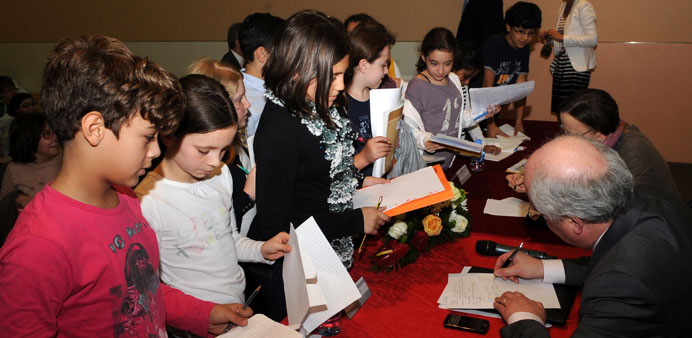By Joey Aguilar/Staff Reporter
French and German missions joined students and teachers in celebrating the 50th anniversary of the signing of the Elysée Treaty at the Lycee Bonaparte school in Doha yesterday.
The historic event on January 22, 1963, led by German Federal chancellor Konrad Adenauer and French president General Charles de Gaulle, signalled the creation of the European Union.
During the press briefing, French Ambassador Jean-Christophe Peaucelle urged the youths of the two countries to work together in keeping and improving this relationship which brought peace and prosperity to both nations.
“Welcome your French comrades when they go to Germany. Don’t be ashamed to speak their language. Of course maybe you will make mistakes but if you wait not to make mistakes, you will never speak,” he said.
“Don’t hesitate. Don’t be shy. Don’t be ashamed, exchange, share your views, your experiences, talk to each other and that’s my advice to you,” Peaucelle said.
Peaucelle and German Ambassador Angelika Storz-Chakarji spoke with a group of students from the German International school of Doha and the French school Lycee Bonaparte.
Since the discussion was in French and German language, Storz-Chakarji told journalists that the students were aware of the history and the relations of the two countries. They asked questions about how to improve the student exchanges between the two countries and how schools can work together more closely.
Stressing the importance of the youth’s role, Peaucelle said peace follows with the exchanges of peoples between France and Germany.
One of the major developments of the treaty was the creation of the Franco-German Youth Office (FGYO), he said.
This means that in 50 years, FGYO has enabled more than 8mn youths from France and Germany to take part in 300,000 exchange programmes. It grants aids on average 9,000 exchanges each year (more than 5,000 group exchanges and about 4,000 individual exchange programmes) in which 195,000 young people take part.
The FGYO, which works with partner organisations, aims to strengthen links between children, young people, young adults and youth leaders in both countries; contribute to the discovery of each other’s culture and to encourage intercultural learning.
“We told the young students that it is up to them for the future. They’ll have some responsibilities, to make the friendship alive and to grow, and the relation between the two countries to be more and more alive everyday,” he said. “This is the meaning of our meeting with the students.”
In an interview, three grade 9 German students said they believe that the treaty was important to them and to the two countries.
Robert Weilack said the signing of the Elysée Treaty is a special day. “It is very important to keep that connection between two countries up, an example for other countries that are in war.”
Like Weilack, Omar Ozon and Michael Sammueller share the same view.
“It’s a great moment, don’t lose it. The world should take this as an example and we should make this worldwide, it’s great that the two countries have great connections,” they said.

Ambassadors share their time with young students.
